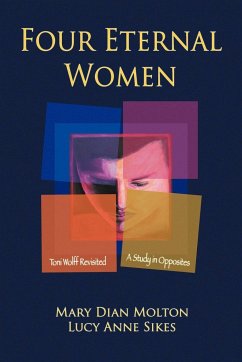Toni Wolff was at first the patient, and later the friend, mistress for a time, long-term colleague and personal analyst of Swiss Psychiatrist Carl Jung. In addition to her work as the founder, leader and teacher for the Psychological Society in Zürich which led to the establishment of the world-renowned C.G. Jung Institute in Zürich/Küsnacht, she published a seminal but little known work called "Structural Forms of the Feminine Psyche" ("Der Psychologie," Berne, 1951). This treatise, certainly one of the first studies in Analytical Psychology, has been the subject of the authors' investigation, attention, research and study for the past twelve years. Toni Wolff's original outline of her four archetypes barely filled fifteen pages of the journal, and was written in the academic style of professional publications of that period, sans illustration or commentary. While Wolff's work has been mentioned in short form in the work of several writers, Four Eternal Women is the first full and serious archetypal delineation of her original thesis, and examines each of her four feminine archetypes from several perspectives: Wolff's Own Words; An Overview of History and Myth; Familiar Characteristics; Lesser-Known (Shadow) Possibilities; Career Inclinations; Relationships to Men; Relationships to Children; Relationships to Each of the Other Types; The tension of the opposites set up by Wolff's own diagrammatic representation of these archetypes provided an additional dynamic to this study. Those who have followed Jung's individuation path will recognize aspects of Jung's 'Transcendent Function.' All readers may well become personally sensitized to discover their own type preferences, and how some aspects of shadow may be present in their 'opposite' partner.
Hinweis: Dieser Artikel kann nur an eine deutsche Lieferadresse ausgeliefert werden.
Hinweis: Dieser Artikel kann nur an eine deutsche Lieferadresse ausgeliefert werden.








